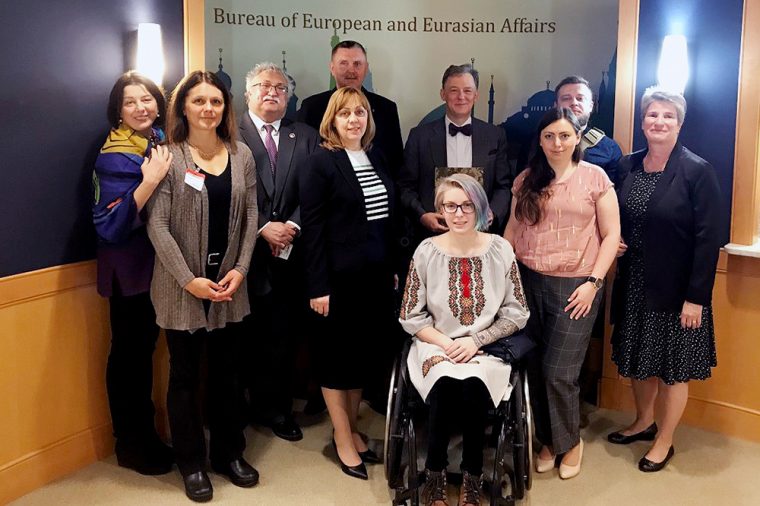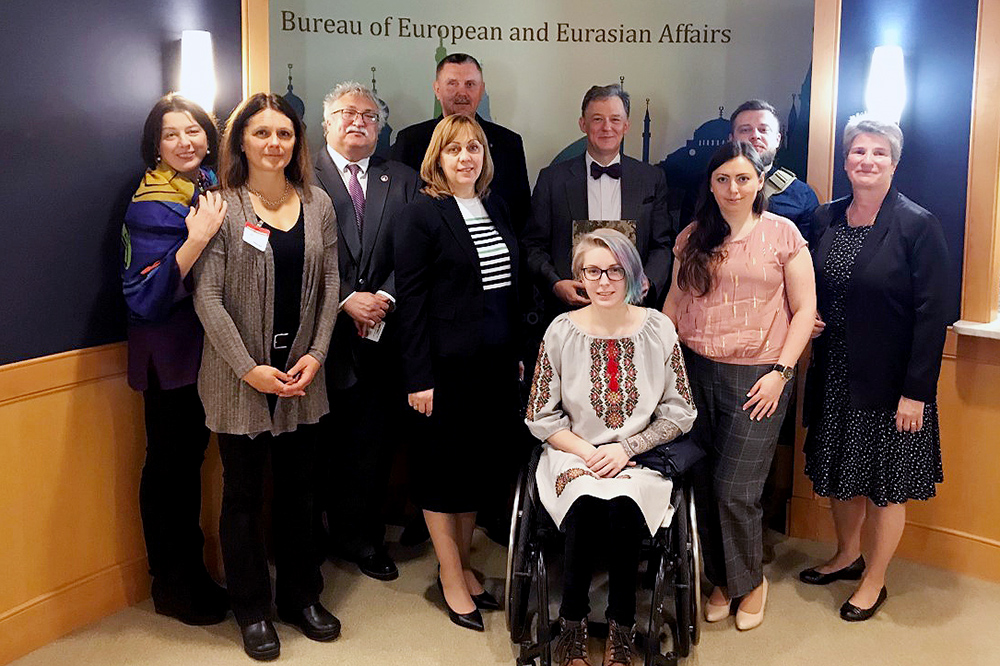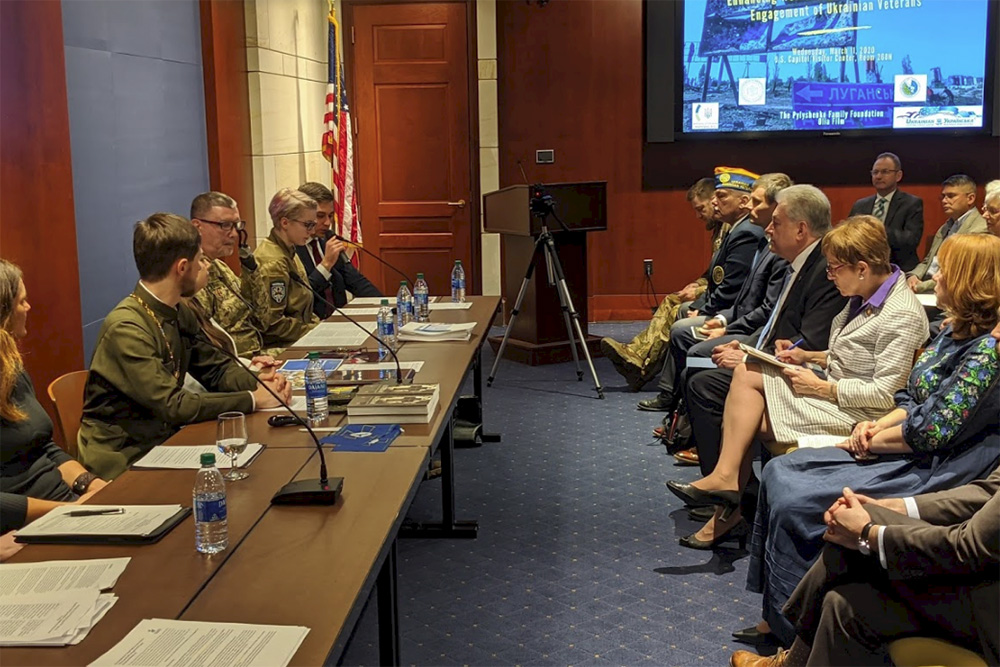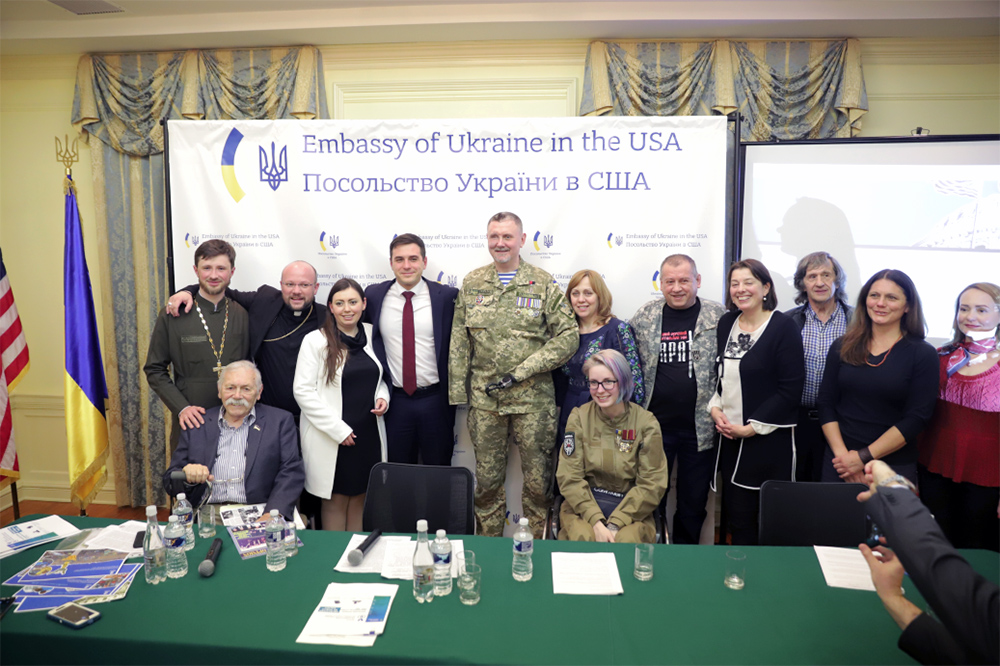Kolcio Shares Healing from Trauma Research with Ukrainian Veterans




Katja Kolcio, chair and associate professor of dance, recently joined other scholars and Ukrainian officials to speak on topics concerning veterans issues and the democratization of civil society in Ukraine during the current war on the border between Ukraine and Russia.
The event, titled “Heroes of Liberty: Enhancing Well-Being, Resilience, and Civic Engagement of Ukrainian Veterans,” took place at the U.S. Capitol Visitor Center on March 11. (The center closed on March 12 due to the COVID-19 pandemic).
Kolcio, who also is an associate professor of Russian, East European, and Eurasian studies, presented her research on “Recurrent Inter-Generational Trauma in the Current State of War,” based on five years of work and research in Ukraine on the role of physical movement practice in response to trauma. Her research began working with families and communities and in civic settings. More recently, she has worked directly with the National Guard and active soldiers in the Armed Forces, as well as veterans.
The event was hosted by Congresswoman Marcy Kaptur (D-Ohio), co-chair of the Congressional Ukrainian Caucus, and co-hosted by that caucus and the Senate Ukraine Caucus. Kaptur and Ukrainian Ambassador to the U.S. Volodymyr Yelchenko delivered the opening remarks, and the panel was moderated by Michael Sawkiw of the Ukrainian Congress Committee of America (UCCA).
Kolcio was joined by Yana Zinkevych, a veteran and member of Parliament of Ukraine. Zinkevych, who was 18 at the start of the war, had been accepted to medical school. Instead, she went to the Donbas, where she founded and directed the Hospitallier Battalion, providing field medicine and surgery on the front. She personally carried 200 wounded soldiers to safety, before being injured herself. Now 24 and in a wheelchair, ZInkevych has been elected to the Ukrainian Parliament and serves on the committees of health and veterans affairs. Oleksandr Tereshchenko, also a civilian who volunteered to defend the country, lost both arms and an eye while defending the airport in Donetsk. As a veteran, he founded an organization that supports wounded veterans and is now serving as Deputy Minister of the Ministry for Veteran Affairs.
“The Donbas region, which has been defended largely by civilian volunteers like Yana and Oleksandr, [exemplifies] the remarkable political changes occurring in Ukraine,” Kolcio said. “Since the Ukrainian Revolution of Dignity in 2013–14, just preceding the invasion by Russia, Ukraine has seen a surge in civic action and civic momentum toward reform and democratization. This is sometimes referred to as Ukrainians building Ukraine, [and] goes largely unrecognized in the international media, but it is a driving force of progress in Ukraine.”
Panelist Marta Pyvovarenko, a psychologist and founder of the NGO Development Foundation with a 40,000-veteran involvement, gave a detailed account of the role that civic organizations have had in sustaining mental health and psychosocial resilience in Ukraine.
Military Chaplain and Bishop of the Ukrainian Greek Catholic Church Stepan Sus and Military Chaplain Svyatoslav Yurkiv of the Kyiv Orthodox Church in Ukraine, concluded the panel by speaking of the interdenominational cooperation between Protestant, Catholic, Orthodox, Jewish, and Muslim communities in supporting the spiritual health of the country.
During the remainder of the week, the presenters met with various organizations and departments in Washington, D.C., including the State Department, Tragedy Assistance Program for Survivors, Department of Veterans Affairs, Open World, and the Atlantic Council, sharing perspectives on the current situation in Ukraine, and advocating for support for the reintegration of veterans in civil life, which is one of the pressing issues in Ukraine, and which impacts geopolitical security in the region.
At the time of the event, buildings and offices were closing due to the escalating COVID-19 pandemic. Kolcio, who spoke about the importance of movement and physical self-awareness during social upheaval, invited the audience to take a deep breath, paying careful attention.
“In light of the continued and worldwide spread of COVID-19 and its resulting social impacts, the value of peer-to-peer engagement, civic action, and the simple act of breathing has become all the more significant,” Kolcio said.
The event was sponsored by civic organizations engaged in the war relief effort in Ukraine, including Ukrainian Congress Committee of America, the United Ukrainian American Relief Committee, the Ukrainian American Cultural Foundation of the Ukrainian Federal Credit Union, Rochester, the Pylyshenko Family Foundation, and OliaFIlm, as well as the Embassy of Ukraine.

